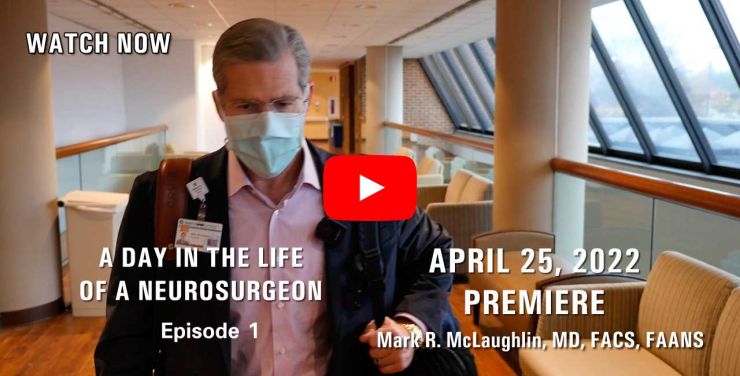Neurosurgeon : A Day In the Life
Dr. Mark McLaughlin shows you the realities of a Neurosurgeon's Day... from the early morning start, through a long day of surgery, teaching, and patient care, to making a contribution to the lives of others on a daily basis. In Episode 1, you'll see how a Neurosurgeon prepares for surgery and learn about creating a framework for peak performance.
Subscribe to Mark's YouTube Channel
The goal of this video is to demystify, to help you know what neurosurgery is. It's to help my patients understand what's going through my mind during the day as I try to serve them. It's for people who might be interested in the neurosciences. It's really for them to just get a look at what it's like.
Yes, it's sometimes scary and challenging, but you know if you work hard enough you can do it.
Getting ready. That's about it. Getting ready.
Okay, so there's a lot of equipment I have in the or here iI've got a cool suit here that I put on. This is the air vent that brings the air to this cool suit..., blows cool air on me so i can work without sweating too much. I'vei got my loupes which I need at times, and then I've got my headlight bag here, so I'm always walking in with a whole bunch of stuff. I look like a traveling minstrel.
Okay, good evening, good afternoon everyone. We're ready to roll. Outstanding. Outstanding.
So just a headlight which helps me see during the surgery. Two biggest advances in neurosurgery in the last hundred years are illumination and magnification, so we can see more with the light and with the magnification. I want the cone of this light to be right where my fingers are working and we'll go scrub.
This is a very important time during the surgery for me I was taught a long time ago by one of my mentors that the most important part of a surgery happens before the incision. That comes with planning..., getting yourself ready and mentally prepared and just thinking. I have a routine that I do for all of my surgeries. I have my five "P"s that I think about.
First I start with a pause. I think about this patient and exactly what their symptoms are. This is a patient that has neck pain and radiation into her shoulders. She has a C4-5 angulation so she's got some pain due to some mild instability of her neck. It's causing her headaches. It's causing her radiating arm pain and putting pressure on her spinal cord.
Then i think about my Plan..., how it's going to go. We get really good positioning. We're going to mark a good incision..., make sure it's exactly where I want to be. Drape everything out. Mmake the incision. Go through the platysma muscle. Come down open the investing sheath of the sternocleidomastoid. Get that plane down... Find the vertebral bodies in the pre-vertebral fascia. Make sure I'm at the right level. Confirm with the radiograph, Then I put the distraction pins in. Distract. Do the discectomy. Bring the microscope in. Do the final discectomy..., the decompression of the spinal cord and the nerve roots..., place the spacers..., lock it down with a plate, and then close. I just think about that plan exactly how it's going to go.
As I said earlier in the other operation... From A to B to C to D to E and no steps in between and no shortcuts, and then,
I think of a Positive thought. Something about how lucky I am to be trained to do this, to have an opportunity to help somebody, to be of service and really just sort of a sense of gratitude and positive thinking.
And then lastly I say a prayer. That's my routine. Gets me ready to go and once that routine is done and I step into this theater, it's game on. You might see me even rolling my legs out and shaking my legs and moving my arms and moving my neck. It's literally like an athletic contest to me. It's like I'm getting ready for a wrestling match but that movement really makes me feel like;;; it just makes me feel like I can do what I need to get done and puts me in the right mode; especially when things are getting hard or tough, that's the time when you've got to really take a little step back, Kind of go back to where you were and think about things and I often times.... I don't know if you notice, I close my eyes. I really try and take myself to a different place. I'm thinking about the surgery. I'm thinking about the films. I'm thinking about this patient and oftentimes will just close my eyes and take a little break. It's like my own green room to be ready for surgery.
If there's an instrumentation rep or a nurse that wants to talk to me, I say don't talk to me here. This is where i get ready to go into the arena and perform.
It's really rewarding and sometimes as a patient you may not understand where i'm coming from, but maybe with this video you might understand a little bit more, and as a student it's just another chance for you to get an experience of what it's like and to decide whether you want to go into it or whether you don't want to go into it.
[Music]










Pardon the Interruption!
I would appreciate it, if you would sign up now to subscribe to my monthly Newsletter. Stay up-to-date as I discuss medicine, wrestling, personal growth, cognitive dominance, and other issues which intrigue me.
Warm Regards
Mark
